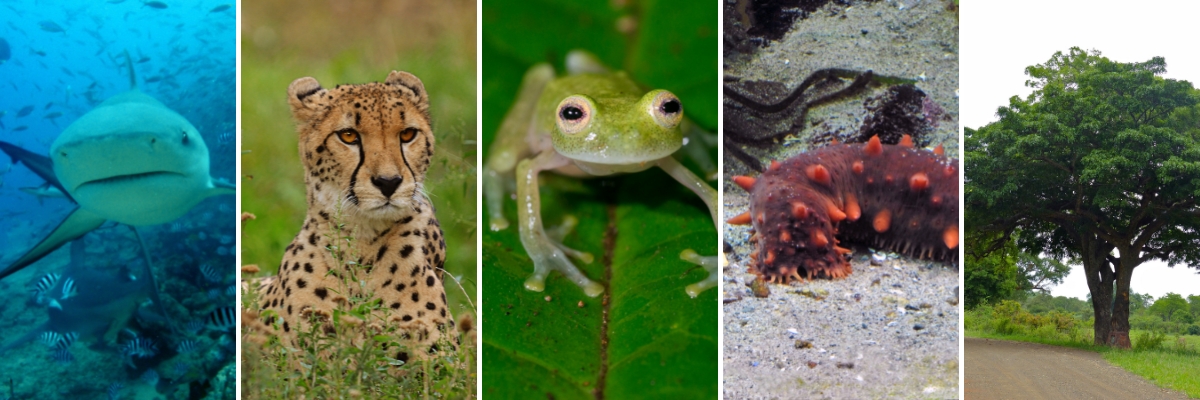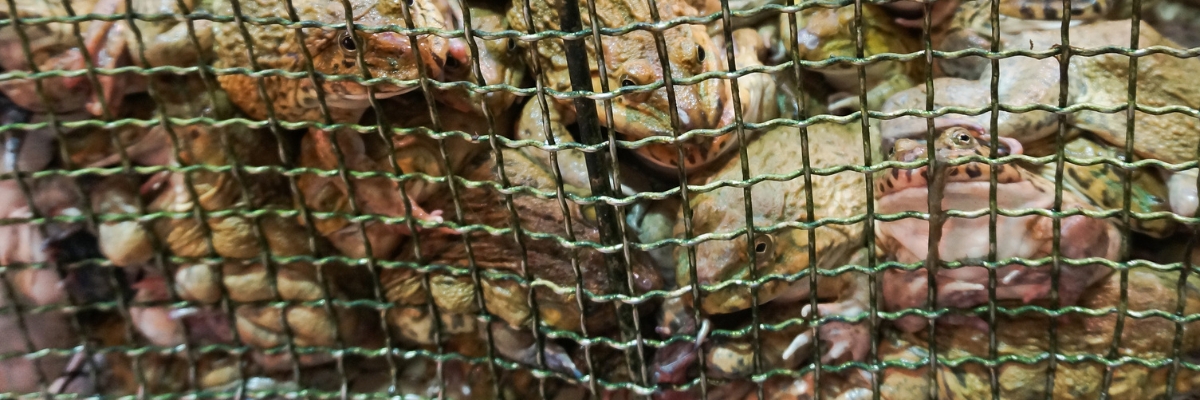This November, representatives from 160 countries gathered in Panama for the 19th meeting of the Conference of the Parties to CITES (CoP19). Before the meeting began, the West African region published the powerful Regional Declaration on a Robust Response to the Extinction Crisis at CoP19, which appealed to the CITES community to be ambitious at CoP19, noting that illegal trade is causing widespread and irreversible damage to biodiversity and vital ecosystem services across West Africa and globally.
At CoP19, the Born Free USA team worked to support the West African region in achieving their ambitions. Born Free USA is pleased to report that CITES did respond to West Africa’s appeal, with more than 500 species newly protected by CITES regulations. These species include frogs, turtles, sharks, rays, and a variety of trees. However, some species did miss out on enhanced protection, such as hippos.

Species Granted Greater Protections
- Sharks and Rays. Almost 100 species of sharks and rays were included in Appendix II, including requiem, bonnethead, and hammerhead sharks, freshwater stingrays, and guitarfishes. These species are under significant pressure from illegal, unsustainable, and unregulated (IUU) fishing for meat and fins. Given that 37% of shark species globally are under threat of extinction, including so many species in CITES was an enormous achievement.
- Sea Cucumbers. Sea cucumbers are heavily exploited for consumption as ‘beche-de-mer’; and are commercially harvested in Asia, Oceania, and eastern Africa. Overharvesting is causing serious population declines, with the wild population of Thelenota ananas already having declined by 80-90%. CITES adopted the inclusion of Thelenota sea cucumbers into the CITES Appendices.
- Cheetahs. Cheetah are already in CITES Appendix I. However, in response to the pervasive illegal trade in cheetah cubs between East Africa and the Middle East, CITES agreed a number of measures focused on bringing the illegal trade to an end. These measures included addressing online trafficking and reviewing legislation.
- Glass Frogs. Glass frogs are in high demand in the exotic pet trade because of their transparent skin and large eyes. Native to Central and South America, illegal trade (including into the U.S.) has been a cause for serious concern. Ten species of glass frog are Critically Endangered, 28 species are Endangered, and 21 species classified as Vulnerable. The Proposal by 14 countries to include Glass frogs in CITES Appendix II was adopted by consensus.
- Tree Species. CoP19 saw more than 150 new tree species covered under CITES rules. These trees include African pod mahoganies, African rosewoods, and Latin American trumpet trees. Although this is a triumph for CITES, range states where these tree species are found will require significant support in enforcing these listings over coming months and years.
Despite these massive wins, efforts to enhance protection for hippos under CITES unfortunately failed. Several Parties trade hippo ivory internationally and they were opposed to a new proposal to have hippos listed on Appendix II. The European Union, a huge voting block at CITES, decided to side with the trading countries, resulting in the rejection of the Proposal.
CITES Adopts Proposals to Combat Zoonotic Diseases
As the first CoP to be held since the COVID-19 pandemic, many believed it was incumbent upon CITES to take all measures possible to reduce the risk of future zoonotic disease emergence and transmission. In response to a strong proposal from West Africa, a suite of new measures were adopted by CITES, including ensuring that live animals in trade are properly cared for in captive breeding and ranching establishments to minimize risk of injury, ill health, or cruel treatment.

Steps Taken to Enhance Enforcement Support
West African countries proposed the establishment of a CITES Enforcement Fund, to support Parties with implementation of CITES, and to combat overwhelming levels of wildlife crime taking place in the West African region and globally. Although CoP19 did not directly support the creation of the Fund, it was agreed that the Standing Committee would consider the establishment of this Fund during its inter-sessional work.
Considerations for Pro-Actively Identifying Species at Risk of Extinction
The CoP adopted Decisions that task the CITES Standing Committee with considering how to provide countries with regularly updated information on the identification of species at risk of extinction that are not yet protected under CITES or receive insufficient CITES protection. These exciting Decisions will hopefully lead to all species being given the level of protection they deserve under CITES!
Born Free USA’s presence at international conferences like CITES CoP19 in only one part of our work to protect animals from wildlife trade. Learn more about our work to support law enforcement in West and Central Africa, our investigations and reports, and our public awareness campaigns.
Keep Wildlife in the Wild,
Shelley

